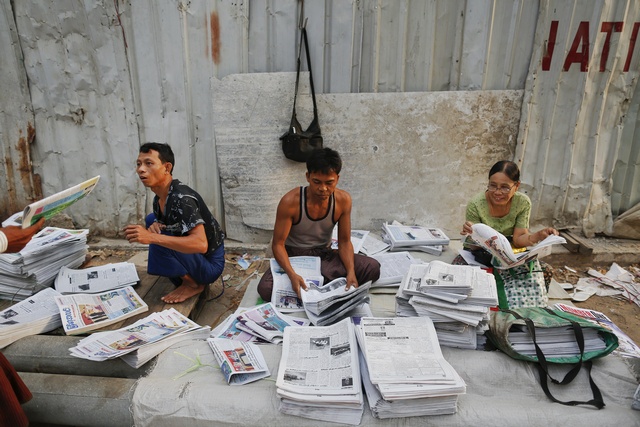Free speech advocates have slammed Burma’s controversial publishing bill, which was passed by the lower house of parliament last week, amid concerns that it will reintroduce censorship in the former military dictatorship.
The draft bill has attracted criticisms for prohibiting the media from criticising Burma’s 2008 constitution, “inciting” social unrest, or “insulting” religion, while empowering the government to ban publications deemed to violate these rules.
“If Myanmar [Burma] is serious about democratisation, it must not adopt this bill,” warned Dr Agnes Callamard, Executive Director of ARTICLE 19, on Tuesday. “It falls far, far below international standards and if it were adopted would, in effect, retain a system of full government control over the media.”
Earlier this week, members of Burma’s interim press council threatened to resign if the draft Printing and Publishing Enterprise Bill were passed in its current format. Council member, Zaw Thet Htwe, told DVB that he was “astonished” at the parliament’s decision to approve the law without addressing their concerns.
Journalists say the new law would mandate a similar function to the junta-era censorship board by creating a “registration official” who is in charge of issuing licences and banning controversial publications. The press council has insisted that this role must be abolished.
But instead the parliament opted to introduce a minor amendment, which allows banned publications to appeal the decision at a regional court.
“We don’t like that anyone has to apply for permission in order to publish something in a democratic era — it is same as the 1962 Printers and Publishers Registration Law,” said Zaw Thet Htwe, referring to the draconian legislation used by the military to silence dissent for nearly five decades.
He added that the Ministry of Information (MOI) had initially agreed to this amendment, yet the provision was still included in the draft submitted to parliament. “This signifies that the MoI still wants to have power over the media.”
Another press council member accused the government of willfully deceiving them. “What they have done is damaging to the trust-building between the two parties,” said Kyaw Min Swe, Chief Editor of the Voice Weekly.
The draft bill, which is set to replace the 1962 law, requires all publications to register with the government or risk spending six months in jail if they are unable to pay a 10 million kyat (US$11,621) fine. It will still need approval from the upper house of parliament, before being signed into law by President Thein Sein.
The press council has also drafted a new press law, which outlines Burma’s legal framework for its nascent media sector and is set to be discussed in the lower house during this parliamentary session. But even this legislation has been criticised for preserving “unjustified” and “undemocratic” state powers, despite recognising the universal right to free expression.
Burma has been lauded by western governments for introducing a series of democratic reforms in the past two years, including easing media restrictions and freeing political prisoners. But a June report by the Committee to Protect Journalists (CPJ) warned that many politically sensitive topics, including ethnic conflicts and religious violence, are still considered off-limits, while cyber-attacks and coercive censorship are on the rise.
“Some reporters said they felt that authorities have allowed just enough freedom to relieve international pressure, while at the same time bidding to impose new, less obtrusive modes of censorship and control,” said the report.
Last month, arrest warrants were issued against a group of activists, who publicly criticised the government’s policy for a controversial copper mine project in central Burma. Meanwhile, the parliament invested several months of time and resources in the hopes of prosecuting a blogger, known as Dr Seik Phwa, for questioning their influence over the judiciary.
In March, the government admitted to “restructuring” its censorship board without consulting parliament, ahead of the introduction of daily newspapers.
Additional reporting provided by Shwe Aung.



